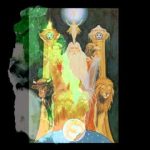Secret History of the JFK Assassination: Conspiracy Theories – Oliver Stone (2013)
Oliver Stone used clips from about 60 fictional movies and TV shows over the course of The Untold History of the United States. He used them as a vehicle for telling stories of specific topics during given episodes. Here is a list of some of the movies Stone used, along with the year these films were originally released.
The Birth of a Nation (1915)
Mr. Smith Goes to Washington (1939)
The Roaring Twenties (1939)
The Wizard of Oz (1939)
Citizen Kane (1941)
Meet John Doe (1941)
Kings Row (1942)
For Whom the Bell Tolls (1943)
The Best Years of Our Lives (1946)
Sands of Iwo Jima (1949)
Twelve O’Clock High (1949)
I Was a Communist for the FBI (1951)
The War of the Worlds (1953)
Godzilla (1954)
Invasion of the Body Snatchers (1956)
The Man in the Gray Flannel Suit (1956)
The Manchurian Candidate (1962)
Dr. Strangelove (1964)
Seven Days in May (1964)
The Battle of Algiers (1966)
Patton (1970)
Star Wars (1977)
The Private Files of J. Edgar Hoover (1977)
Apocalypse Now (1979)
Heaven’s Gate (1980)
Star Wars Episode VI: Return of the Jedi (1983)
The Day After (1983)
Rambo: First Blood Part II (1985)
Salvador (1986)
Wall Street (1987)
Rambo III (1988)
Truman (1995)
Saving Private Ryan (1998)
Gladiator (2000)
Thirteen Days (2000)
Ali (2001)
Black Hawk Down (2001)
Pearl Harbor (2001)
Syriana (2005)
Borat (2006)
The Good Shepherd (2006)
Charlie Wilson’s War (2007)
Act of Valor (2012)
Safe House (2012)
Seal Team Six: The Raid on Osama Bin Laden (2012)
Zero Dark Thirty (2012)
At one point or another, Stone also used clips from the following TV shows:
Father Knows Best
The Twilight Zone
Saturday Night Live
Survivor
24
Homeland
In 2012, The Guardian journalist Glenn Greenwald highly recommended the series and book,[21] describing it as “riveting”, “provocative” and “worthwhile”.[22]
Former Soviet President Mikhail Gorbachev wrote approvingly of the book:[23]
“Oliver Stone and Peter Kuznick provide a critical overview of US foreign policy during the past few decades. There is much here to reflect upon. Such a perspective is indispensable at a time when decisions are being taken that will shape America’s role in the global world of the twenty-first century. At stake is whether the United States will choose to be the policeman of a “Pax Americana”, which is a recipe for disaster, or partner with other nations on the way to a safer, more just and sustainable future.”
David Wiegand wrote for the San Francisco Chronicle: “The films are at their best when they provide a panoramic view of our history in the middle part of the 20th century. Ably abetted by the superb editing work by Alex Marquez”.[24] Verne Gay for Newsday similarly praised the craft: “By far the most interesting part of “Untold” is the visual presentation. Stone has cobbled together a mother lode of chestnuts, including grainy newsreel footage and Soviet propaganda films. It’s all weirdly engrossing” but found the content less than provocative: “You keep waiting for a fresh insight, a new twist, a bizarre fact and after a while would even be profoundly grateful for some wacky Stone revisionism. It never comes. What’s “untold” here?”[25]
Stone defended the program’s accuracy to TV host Tavis Smiley:[26]
‘This has been fact checked by corporate fact checkers, by our own fact checkers, and fact checkers [hired] by Showtime. It’s been thoroughly vetted…these are facts, our interpretation may be different than orthodox, but it definitely holds up.
In November 2012, Hudson Institute adjunct fellow historian Ronald Radosh (who was averse to the project since its announcement and encouraged a write-in campaign to cancel the series)[27][28] lambasted it as “mendacious” Cold War revisionism and “mindless recycling of Stalin’s propaganda,” claiming similarities to Communist author and NKVD agent Carl Marzani’s Soviet-published treatise We Can Be Friends.[29] Writes Radosh:
“Over and over, Stone uses the same quotations, the same arrangements of material, and the same arguments as Marzani. This is not to accuse Stone of plagiarism, only to point out that the case he now offers as new was argued in exactly the same terms by an American Communist and Soviet agent in 1952.”
Libertarian journalist Michael C. Moynihan criticized the book for “moral equivalence between the policies of the psychotically brutal Soviet Union and the frequently flawed policy of the United States” and called the title “misleading” in that nothing within the book was “untold” previously. Moynihan also claimed factual errors and questionable sources.
http://en.wikipedia.org/wiki/Oliver_Stone%27s_Untold_History_of_the_United_States
Leave A Reply
You must be logged in to post a comment.









 Paranormal
Paranormal

